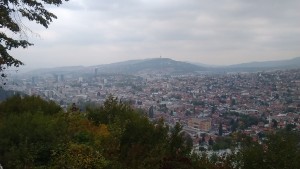(Pictured: Sarajevo, the capital city of Bosnia and Herzegovina)
This week we lead an excursion to Bosnia and Herzegovina. A land that just a short 20 years ago experienced a war so horrific, and terrors that haven’t been seen on European soil since World War II.
While the stay in the two cities of Sarajevo, and Banja Luka was enjoyable, it nevertheless was more important to realize how such a country is functioning shortly after the war in the 1990s.
While the war is slowly further, and further into the past, the problems are still present in today’s society. To end the war, the warring sides within Bosnia agreed on signing a peace agreement in Dayton, Ohio; this became known as the Dayton Peace Agreements. While it did initially end the war, and establish a sort of functional government in the country of Bosnia, it had many problems with its implementation and these cracks are visible today.
Throughout the lectures we had, I came to one conclusion: that the state of affairs in Bosnia will not stay the same for much longer. The complexity of the issue is much greater in scope than can be explored in a blog post, but as it stands the Peace Agreement does not account for a number of things, and change can only happen if there is enough incentive for change; especially in terms of the political sphere. The current situation is that there are two entities that were established, the Federation of Bosnia and Herzegovina (51% of territory) and Republika Srpska (49%). With a tri-presidency system in place (effectively there are three presidents). The Republika Srpska (RS) political system is threatening a referendum, which while not blatantly saying it is for independence, it practically can be deduced as so (as according to a lecturer working for the UN in Bosnia for 10 years)causing an uneasy relationship of FBiH, and the BiH political structure in its entirety to that of RS. This unstable relationship of political systems is causing a shifting power sharing structure.
———————————————————————————–
While the above is very important for the current political situation, the people themselves and physical city settings offer a different feeling, rather than one through statistics. I have found Bosnia to be one of the places that has the most pronounced spirit, that anyone is able to feel just by walking down its city walkways.

